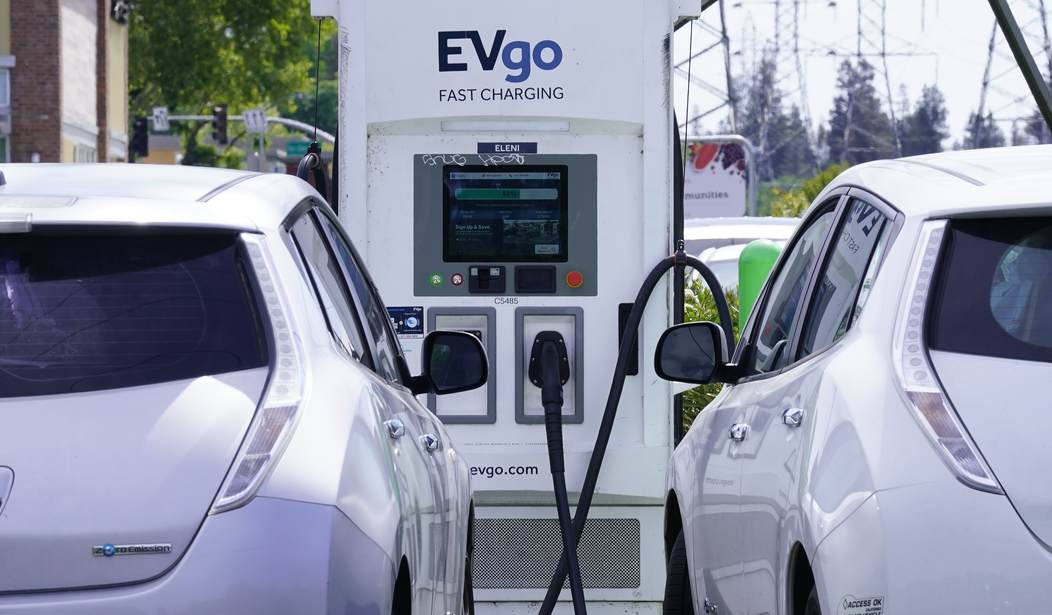Last week, CNBC solemnly declared “EV euphoria is dead.” But the real question should be: was there ever an electric vehicle (EV) euphoria? To me and other casual observers, it was simply wishcasting by net-zero proponents to mandate EV ownership by arbitrary deadlines.
“The buzz around electric vehicles is wearing off,” the report detailed. “For years, the automotive industry has been in a state of EV euphoria. Automakers trotted out optimistic sales forecasts for electric models and announced ambitious targets for EV growth. Wall Street boosted valuations for legacy automakers and startup entrants alike, based in part on their visions for an EV future.”
“Now the hype is dwindling, and companies are again cheering consumer choice,” it concluded.
Investment website Barron’s noted the EV bubble - or more accurately, the EV mirage - cost investors $1.5 trillion. Back in January, a massive sell-off of EV stock occurred—with depreciation as high as 90% from their peak.
Business Insider observed, “That sell-off marks a sharp turnaround from the pandemic, when there was hype galore for EV firms, multiple of which went public with valuations exceeding $100 billion…Today, almost all EV stocks that went public or merged with SPACs in the last 5 years are trading at lower than their debut price — many significantly so.”
Recommended
Bloomberg reported, “Gone are the days of starry stock market debuts that sent valuations of electric-vehicle makers soaring. Now, floating an EV stock is only for the brave.”
This declaration is perfectly timed ahead of Wednesday’s expected unveiling of the Environmental Protection Agency (EPA)’s finalized tailpipe emission rule to mandate 67% of new vehicles produced be EVs by 2032 to drop. POLITICO reported:
In last year’s proposal, EPA projected meeting the tightened pollution requirements would mean that 67 percent new vehicle sales in 2023 would be electric vehicles, an order of magnitude greater than current national sales levels. The rule does not mandate any specific level of electric vehicle sales, but the Biden administration projected automakers would choose to comply by increasing those sales.
This comes after another report foretold a slower roll-out of the EV mandate, given little consumer demand and car dealerships (rightfully) complaining about EVs piling up on their lots.
There’s even more bad news for EVs on the horizon beyond the delayed EPA rule.
First, car rental company Hertz - which scaled down a third of its EV fleet (20,000 cars) and added more internal combustion engine (ICE) offerings - continues to suffer from the fallout of forcing EVs on its consumers. Not only did it have its worst performance in Q4 2023, but its CEO Stephen Scherr, just two years into the job, announced his departure from the company. Here’s the reason behind his exit:
Hertz doubled down on EVs in the months after Scherr took over, placing big orders with Polestar, the electric-car maker owned by China’s Geely and Sweden’s Volvo Car, and GM. The company ended up buying a small number of cars from the two companies, a spokesperson said.
Hertz announced its EV sell-down plans in January, citing lackluster demand, costly depreciation and expensive repairs. The Estero, Florida-based company took a $245 million charge and reported its biggest quarterly loss since the pandemic.
Poll after poll last year found the EV hype was overblown.
Last summer, Pew Research Center found 63% of Americans weren’t likely or don’t plan to purchase EVs anytime soon. An October 2023 Yahoo! Finance/Ipsos poll delivered similar results— reporting most Americans are unlikely to buy EVs.
Americans aren't going to go along with mandates–especially in a post-COVID pandemic world.
EVs have all sorts of unknowns, a lower driving range, require endless charging, are built using child labor, and are 30% heavier than ICE cars.
A 2022 Emissions Analytics report – reupped by a recent Wall Street Journal editorial - found EV brakes and tires are worse for the environment than ICE equivalents. It’s about 1,850 times more particle pollution.
Even if the federal EV rule is blocked in a federal court - god-willing - Americans in 17 states and Washington, D.C., are unaware that their states are yoked to the California Air Resources Board emissions standards that entirely ban gas-powered cars by 2035.
The Biden EPA is said to be reviewing the 2022 rule, per the WSJ, “The Biden administration is reviewing California’s plan to ban the sale of new gasoline-powered cars by 2035. To get federal approval, California claims it “needs” this ban to prevent harm to public health from particulate matter—airborne particles like dust, dirt and soot. But banning gasoline cars would do little to reduce particulate emissions, and it could even increase them.”
The publication criticized the Golden State’s policy of mandating “zero emissions vehicles” by 2035, calling the marketing tactic deceptive since they still produce particulate pollution–if not more than ICEs. Ironically, California is unaware that EV tires and brakes are often petroleum and oil derivatives.
Americans shouldn’t be forced to abandon reliable cars for unproven, subsidized alternatives that aren’t ready for primetime. Let consumers - not the government - choose the best vehicles for them and their needs.

























